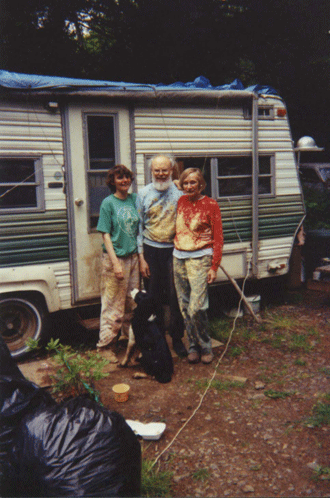My 1993 year-end letter where I tell about hoops I had to go through to get a construction loan, putting in a water system with the help of a pot farmer, and having one of my contractors die just as we started to build my cabin.
December 1993
Dear Friends and Family,
I’m dreaming of a wet and windy Christmas. It’s been raining for a week and the wind is blowing at 80 mph. This time last year I was housing impaired: living in a leaky trailer with no electricity or running water. I’m still housing impaired, but the leaky trailer now has electricity and water, and next to it is the shell of a small cabin I hope to move into within a year or two. I drew house plans during my lunch hours and managed to have them approved by the planning department.
I am never building another house. I am never moving. When people tell me I should do such-and-such to increase its resale value I assure them that I plan on dying in this home.
The week after the plumber put in water pipes we had our first freeze of the year and my pipes burst. The day before the electrician came a tree fell across my power line. I don’t think the homesteaders had many more problems than I’ve had. This year I worked on the Forest Service’s wagon train commemorating the Oregon Trail’s Sesquicentennial, so I know they didn’t. For one thing, they didn’t have to get loans.
It took six months before a bank seriously looked at my application. Mr. Hamilton, the vice president of the Bank of Newport, called while I was digging ditches to put lines in for my septic system, the greatest trenching project since World War I. I was a muddy mess. “Can you come right over?” he asked. I said that at the moment I didn’t look like somebody you’d loan money to. He promised to not judge me on appearances. When I got to the bank he said: “Your loan has been approved if you can solve your water problem.”
A few months earlier the Ranger District’s LEO (Law Enforcement Officer), knowing I had no running water because I didn’t have electricity to run a pump, cornered me and said in hushed tones, “You need to get in touch with a pot farmer. Pot farmers aren’t on the grid so they know how to get water without power. And, of course, you didn’t hear this from me.”
I was referred to a “retired” pot farmer who helped me install a “gravity feed” water system similar to one he uses—I mean used–to water acres of illegal pot plants. We hauled a half-mile of PCV piping through a creek and dense brush to an elevation about 500 above the trailer and hooked it up to an old wooden TNT crate that acts as a “spring box.” The creek doesn’t flow year-round, though, so it was only a partial solution.
A full solution involved an acre of land I bought from a neighbor last year. It has a year-round creek running through it and I’ve applied for water rights so I can legally pump from it.
It turns out the acre was owned by lots of people. My neighbor only owned a 75% share of it. The remaining 25% was owned by a southern California limited partnership, whatever the heck that is. A general partner for the partnership signed the deed. The bank said they needed proof he had the authority to sign for all partners. For that, they needed a copy of the partnership agreement.
The man refused to send a copy. He said it was too trivial a matter for him to bother with. He’s a high-priced attorney and I offered him his hourly fee for one hour–a sum larger than my biweekly paycheck–to take the time to photocopy the agreement, pop it in an envelope and drop it in the mail. It turned out time wasn’t the problem. He said the agreement wasn’t any of my “damn” business. In the agreement there are probably bits of skullduggery that they don’t want anyone else to know about, or so explained another high-priced lawyer.
I wrote the general partner that this property wasn’t an investment for me, it was where I planned on living and if I couldn’t build a house on it, I’d tow my dilapidated leaky trailer with my 1951 Plymouth down to southern California and park in front of his house, in front of his office, in front of his church, and in front of anywhere else he went.
Soon thereafter Mr. Hamilton called to ask if I could come in the next afternoon to sign for a loan. I held off celebrating until I had signed since there was no telling what could happen in 24 hours. Mr. Hamilton could have been hit on the head by space debris and woke up thinking he was a trained seal. Fortunately, Mr. Hamilton is alive and well as I type and I can borrow up to $40,000 on my construction loan.
Soon thereafter the power company installed two poles about a quarter mile apart and strung a line to my property. They strung the first 100 feet of line for free. I had to pay $5,000 for them to string the rest. Oh well. Easy come. Easy go.
I flipped the switch for the first time in the trailer and the lights didn’t turn on because I didn’t have any light bulbs. I plugged in my Macintosh and worked at it by lantern light, just the way I’m sure Abraham Lincoln did his computing.
Dave and Bill, my contractors and very dear friends plunged into the project. Within a week I had my first inspection: the rebar inspection for the foundation. When Dave was putting in the footings he said he was doing more than “code” required. I thought it was contractor bravado. Then the inspector came. “Good grief,” he cried. “These footings are wide enough to support a 20-story building.” As I stopped by the bank I looked at an addition they were building. I looked at the footings, something I had never looked at before. “They call those pathetic puny things footings” I scoffed. Construction sites will never be the same for me.
Weeks later Dave called with devastating news. Bill had died in his sleep. I was stunned. Bill was more than my carpenter. He was a good friend. He was Dave’s best friend and you could see the two of them had fun working together. I never once heard them get mad at one another. For a time neither Dave nor I wanted to do much with the house.
But life goes on. Dave is back at work and we’re even able to joke about Bill. See a crooked nail and one of us will ask, “Who put this in?” “Bill did,” is the response. Find a tool outside and one of us will ask, “Who left this here?” “Bill did,” is the response. We know Bill would have appreciated it because he was always laughing, especially at his own expense.
As I now sit in what will be my living room and look out at the surrounding forest I am truly grateful for all that I have and I wouldn’t trade my life for anything.
I hope you and yours are well and you have a great year.
T-
Construction Cartoons and Bank Cartoons for use in books, ads, websites, etc. So cheap you can use them as wall insulation.

Buy Construction Cartoon 6095
Get it Printed on Stuff from Zazzle

